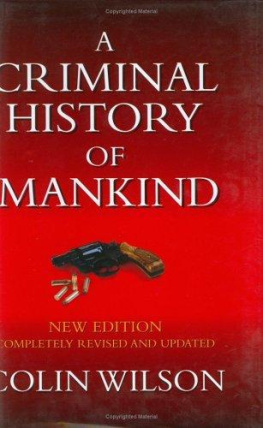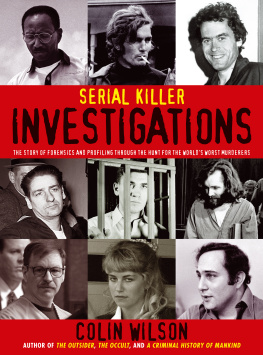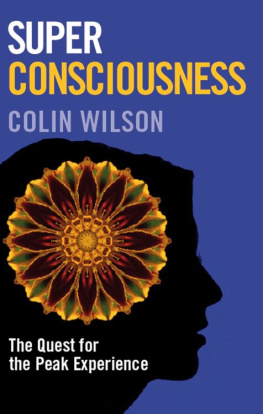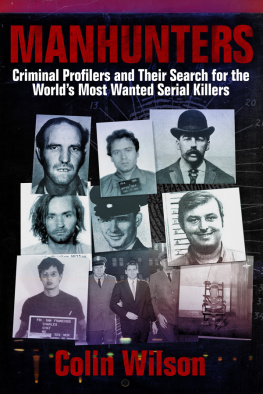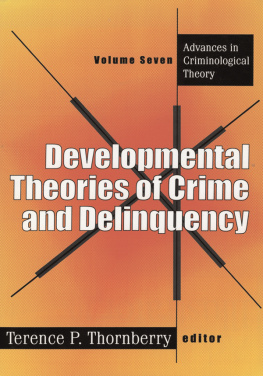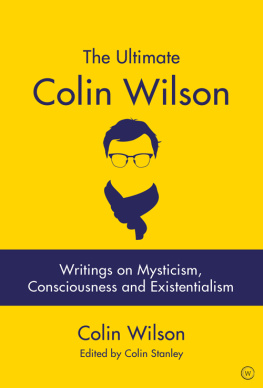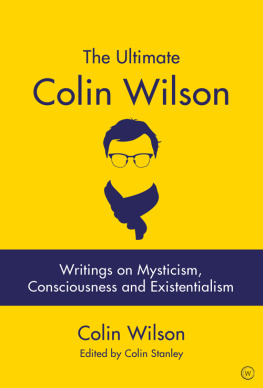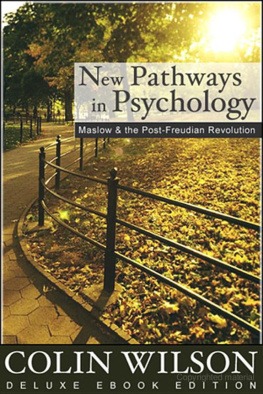A
CRIMINAL
HISTORY OF
MANKIND
by
Colin Wilson
GRANADA
London Toronto Sydney New York
Granada Publishing Limited
8 Grafton Street
London W1X 3LA
Published by Granada Publishing 1984 Copyright Colin Wilson 1984
British Library Cataloguing in Publication Data
Wilson, Colin
A criminal history of mankind,
1. crime and criminals History
I. Title 364.09 - HV6O25
ISBN 0-246-11636-6
Printed in Great Britain by
Richard Clay (The Chaucer Press) Ltd, Bungay, Suffolk
All rights reserved. No part of this publication may be reproduced, stored in a retrieval system, or transmitted, in any form or by any means, electronic, mechanical, photocopying, recording or otherwise, without the prior permission of the publishers.
Scanned : Mr Blue Sky
Proofed : Its Not Raining
Version : 2.0
Date : 03/12/2002
INTRODUCTION
I was about twelve years old when I came upon a bundle of magazines tied with string in a second-hand bookshop - the original edition of H. G. Wellss Outline of History , published in 1920. Since some of the parts were missing, I got the whole pile for a few shillings. It was, I must admit, the pictures that attracted me - splendid full-page colour illustrations of plesiosaurs on a Mesozoic beach; Neanderthal men snarling in the entrance to their cave; the giant rock-hewn statues of Rameses II and his consort at Abu Simbel. Far more than Wellss text, these brought a breathless sensation of the total sweep of world history. Even today I feel a flash of the old magical excitement as I look at them - that peculiar delight that children feel when someone says, Once upon a time ...
In 1946, Penguin Books republished ten volumes of Wells to celebrate his eightieth birthday, including the condensed version of the Outline, A Short History of the World . It was in this edition that I discovered that strange little postscript entitled Mind at the End of Its Tether. I found it so frustrating and incomprehensible that I wanted to tear my hair: Since [1940] a tremendous series of events has forced upon the intelligent observer the realisation that the human story has already come to an end and that Homo sapiens , as he has been pleased to call himself, is in his present form played out. And this had not been written at the beginning of the Second World War - which might have been understandable - but after Hitlers defeat. When I came across the earlier edition of the Short History I found that, like the Outline , it ends on a note of uplift: What man has done, the little triumphs of his present state, and all this history we have told, form but the prelude to the things that man has yet to do. And the Outline ends with a chapter predicting that mankind will find peace through the League of Nations and world government. (It was Wells who coined the phrase the war to end war.)
What had happened? Many years later, I put the question to a friend of Wells, the biblical historian Hugh Schonfield. His answer was that Wells had been absolutely certain that he had the solutions to all the problems of the human race, and that he became embittered when he realised that no one took him seriously. At the time, that seemed a plausible explanation. But since then I have come upon what I believe to be the true one. In 1936, Wells produced a curious short novel called The Croquet Player , which is startlingly different from anything he had written before. It reveals that Wells had become aware of mans capacity for sheer brutality and sadism. The Outline of History plays down the tortures and massacres; in fact, it hardly mentions them. Wells seems totally devoid of that feeling for evil that made Arnold Toynbee, in his Study of History , speak of the horrifying sense of sin manifest in human affairs. Wellss view of crime was cheerfully pragmatic. In The Work, Wealth and Happiness of Mankind he spoke of it as artificial, the result of restrictions imposed upon the normal natural man in order that the community may work and exist. He seems quite unaware that the history of mankind since about 2500 B.C. is little more than a non-stop record of murder, bloodshed and violence. The brutalities of the Nazi period forced this upon his attention. But it seems to have been the horrors of Hiroshima and Nagasaki, and the revelations of Belsen and Buchenwald, which convinced him that man was bound to destroy himself from the beginning, and that the final end is now closing in on mankind.
I am not suggesting that Wellss view of history was superficial or wrong-headed; as far as it went, it was brilliantly perceptive. As a late Victorian, he was aware of the history of mankind as a marvellous story of invention and achievement, of a long battle against danger and hardship that had resulted in modern civilisation. And it is certainly true that mans creativity is the most centrally important fact about him. What Wells failed to grasp is that mans intelligence has resulted in a certain lopsidedness, a narrow obsessiveness that makes us calculating and ruthless. It is this ruthlessness - the tendency to take short-cuts - that constitutes crime. Hitlers mass murders were not due to the restrictions imposed on natural man so the community can exist. They were, on the contrary, the outcome of a twisted kind of idealism, an attempt to create a better world. The same is true of the destruction of Hiroshima, and of the terrorist bombings and shootings that have become everyday occurrences since the 1960s. The frightening thing about the members of the Japanese Red Brigade who machine-gunned passengers at Lod airport, or the Italian terrorists who burst into a university classroom and shot the professor in the legs - alleging that he was teaching his students bourgeois values - is that they were not criminal lunatics but sincere idealists. When we realise this we recognise that criminality is not the reckless aberration of a few moral delinquents but an inevitable consequence of the development of intelligence, the flip side of our capacity for creativity. The worst crimes are not committed by evil degenerates, but by decent and intelligent people taking pragmatic decisions.
It was basically this recognition that plunged Wells into the nihilism of his final period. He had spent his life teaching that human beings can be guided by reason and intelligence; he had announced that the First World War had been fought to end war and that the League of Nations and world government would guarantee world peace. And at that point, the world exploded into an unparalleled epoch of murder, cruelty and violence: Stalins starvation of the kulaks, the Japanese rape of Nanking, Hitlers concentration camps, the atomic bomb. It must have seemed to Wells that his whole life had been based on a delusion, and that human beings are incorrigibly stupid and wicked.
If Wells had understood more about the psychology of violence, he would not have allowed this insight to plunge him into despair. Criminality is not a perverted disposition to do evil rather than good. It is merely a childish tendency to take short-cuts. All crime has the nature of a smash and grab raid; it is an attempt to get something for nothing. The thief steals instead of working for what he wants. The rapist violates a girl instead of persuading her to give herself. Freud once said that a child would destroy the world if it had the power. He meant that a child is totally subjective, wrapped up in its own feelings and so incapable of seeing anyone elses point of view. A criminal is an adult who goes on behaving like a child.
But there is a fallacy in this childish morality of grab-what-you-want. The person who is able to indulge all his moods and feelings is never happy for more than a few moments together; for most of the time, he is miserable. Our flashes of real happiness are glimpses of objectivity , when we somehow rise above the stifling, dreamlike world of our subjective desires and feelings. The great tyrants of history, the men who have been able to indulge their feelings without regard to other people, have usually ended up half insane; for over-indulged feelings are the greatest tyrants of all.
Next page
